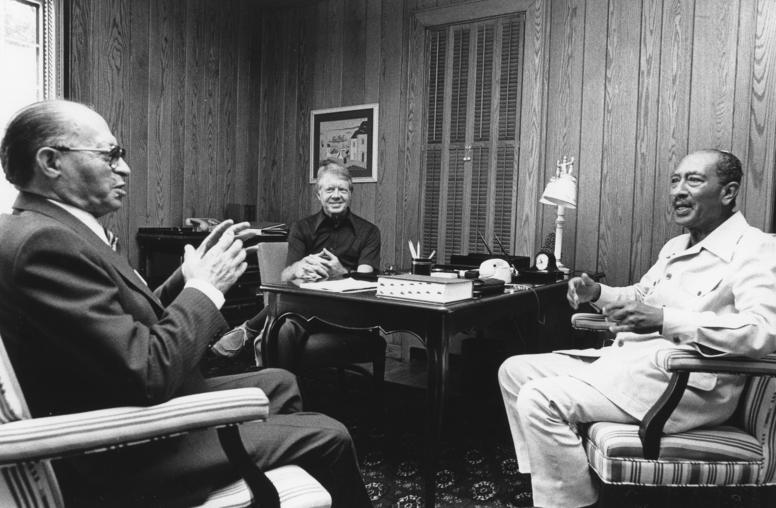USIP Specialists Call Security Sector Reform in North Africa Difficult but Essential
On November 5, USIP convened a panel of experts to discuss the array of difficulties in restructuring military, police and intelligence agencies that persist after the initial optimism with demise of previous regimes.

November 7, 2012
The reform of security sectors in Tunisia, Egypt and Libya is critical to the success of the political transitions underway since the historic uprisings against authoritarian governments in those countries, but such efforts have had a slow start and face major obstacles that reflect the broader struggles to develop democratic systems, according to specialists with the U.S. Institute of Peace (USIP).
The USIP experts spoke at a November 5 forum, “The Challenge of Security Sector Reform in the Arab World,” which focused on the array of difficulties in restructuring military, police and intelligence agencies that persist after the initial optimism with demise of previous regimes.
Calling security sector reform “an urgent topic,” Steven Heydemann, USIP’s senior adviser for Middle East initiatives, said its success “will largely determine the fate of the transitions…that began almost two years ago.” He referred to “troubling signs,” including clashes among militias in Libya and resistance to reform within the security establishments of Egypt and Tunisia.
Robert Perito, director of USIP’s Security Sector Governance Center, noted that in Tunisia, Egypt and Libya the security sectors were physical symbols of the “denial of fundamental human rights.” In each country, he said, “security is the primary concern of the people and its leaders.” The reform situation in each country has some common features but there are considerable differences as well, Perito said. Tunisia and Egypt have strong security institutions that endure, while Libya’s were effectively dismantled by the Qaddafi regime and must now be rebuilt, he said.
Security sector reform involves not only security agencies but also the executive branch of government and the courts, and it “is a highly political process,” Perito said. The reforms need public buy-in and to incorporate principles of good governance, and they need to include civilian oversight of security agencies, even though the region has little tradition of that, he said. The obstacles suggest that 2013 will be “a year of very rocky times,” he said.
Tunisia. “There’s still cause for optimism,” Querine Hanlon, the National Defense University senior fellow at USIP’s Academy for International Conflict Management and Peacebuilding, said of reform prospects. However, the country is struggling with growing violence, including the September attack by protesters on the U.S. Embassy in Tunis, and police are demanding more pay and protection and do not have clear authority in the use of force, she said. Despite elections that resulted in a coalition government led by a moderate Islamist party, “very little has been accomplished in the past year,” said Hanlon, author of a USIP Special Report, “Security Sector Reform in Tunisia: A Year after the Jasmine Revolution.” Neither Islamists nor secularists are happy with the caretaker government’s approach to the security sector, which remains “unprepared for a new role” in a democracy, she said. Without security reforms, Hanlon said, “Tunisia’s transition may well be in danger.”
Egypt. Security sector reform is being blocked by the military’s unwillingness to extract itself from its considerable economic interests and influence over political affairs, said Daniel Brumberg, USIP senior program officer for the Middle East and co-director of the Democracies Studies Program at Georgetown University. “There are much deeper interests,” he said. “There’s huge resistance.” A prospective withdrawal of Egypt’s military from the political sphere is seen by secularists as removing their protection from Islamist power, he said. Brumberg suggested that “quiet diplomacy” by the United States, in dialogue with Egypt’s security sector, holds the best prospects for moving forward.
Hesham Sallam, co-editor of the web magazine Jadaliyya, agreed that “there are no clear signals” the Egyptian military will cede its political and economic privileges. “There’s a long road ahead,” he said. President Mohamed Morsi, who must manage the pressures from entrenched bureaucrats known as “the deep state” and his own Muslim Brotherhood, will play a critical role in building a national consensus for security reforms amid political polarization in Egypt, Sallam said. Brumberg and Sallam co-authored a USIP Special Report released last month, “The Politics of Security Sector Reform in Egypt.”
Libya. Militia violence remains the biggest fear of Libyans, and many remain in operation with no criteria yet for disbanding and disarming them, said Manal Omar, director of USIP’s Iraq, Iran and North Africa programs. The militias have asserted control over private properties in some cases, producing additional triggers of future conflict. The country’s General National Congress was not even able to provide for its own security recently, and yet officials will need to develop a way forward in the security sphere that provides protection for the public before disarmament of the militias can proceed successfully, she said. Building public trust in the security agencies “is going to take a lot of time,” she said, and quick, short-term fixes need to be avoided.



